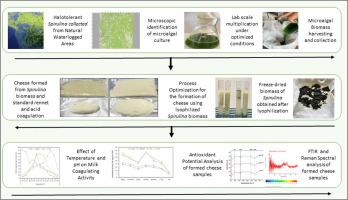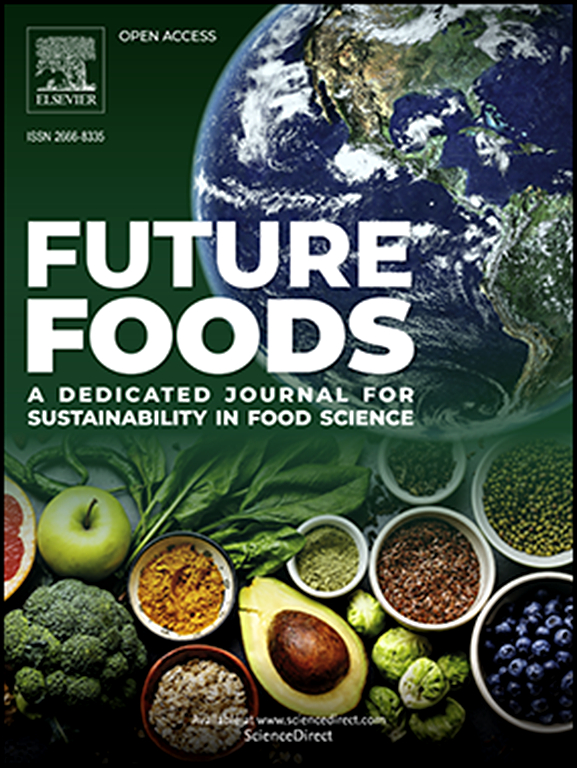Advancing microalgal applications: Process optimization and functional integration of lyophilized Spirulina biomass in formation of protein-enriched cheddar-type cheese
IF 7.2
Q1 FOOD SCIENCE & TECHNOLOGY
引用次数: 0
Abstract
Spirulina is a well-known food supplement renowned for its high protein content, bioactive compounds, and enzymes that are pivotal in its metabolic processes. This study explores the potential of Spirulina as a sustainable alternative to animal rennet, proposing it as a vegetarian functional ingredient in cheddar-type cheese production. The research utilized response surface methodology (RSM) to optimize the incorporation of lyophilized Spirulina biomass, focusing on maximizing protein content and antioxidant potential. The optimized process resulted in cheese yields ranging from 1.96 % to 6.01 % and protein contents between 14.29 % and 39.21 %. We identified and standardized conditions for achieving these optimal outcomes. Analysis of milk clotting activity (MCA) and proteolytic activity (PA) showed pH and temperature-dependent variations, with traditional rennet and acetic acid cheeses demonstrating superior MCA. In contrast, Spirulina-enriched cheeses exhibited enhanced antioxidant activity (20.69 % to 37.66 %), improved protein retention, and lower fat content, attributed to its inherent bioactive compounds. Fourier-transform infrared (FTIR) and Raman spectroscopy provided insights into the molecular composition and structural changes during storage, highlighting the distinctive properties of Spirulina-derived cheese. This study underscores the viability of integrating Spirulina biomass into cheese production, offering a pathway to create nutritious, antioxidant-rich products with elevated protein content and functional benefits.

推进微藻应用:冻干螺旋藻生物质在制作富含蛋白质的切达干酪过程中的工艺优化和功能整合
螺旋藻是一种著名的食品补充剂,以其高蛋白含量、生物活性化合物和在新陈代谢过程中起关键作用的酶而闻名。本研究探讨了螺旋藻作为动物凝乳酶可持续替代品的潜力,提出将其作为切达干酪生产中的素食功能配料。研究利用响应面方法(RSM)优化了冻干螺旋藻生物质的加入,重点是最大限度地提高蛋白质含量和抗氧化潜力。优化后的工艺使奶酪产量介于 1.96 % 到 6.01 % 之间,蛋白质含量介于 14.29 % 到 39.21 % 之间。我们确定并标准化了实现这些最佳结果的条件。对牛奶凝固活性(MCA)和蛋白水解活性(PA)的分析表明,牛奶凝固活性随 pH 值和温度的变化而变化,传统的凝乳酶和醋酸奶酪的牛奶凝固活性更高。相比之下,富含螺旋藻的奶酪表现出更强的抗氧化活性(20.69% 到 37.66%)、更高的蛋白质保留率和更低的脂肪含量,这归功于其固有的生物活性化合物。傅立叶变换红外光谱(FTIR)和拉曼光谱深入分析了贮藏过程中的分子组成和结构变化,凸显了螺旋藻衍生奶酪的独特特性。这项研究强调了将螺旋藻生物质融入奶酪生产的可行性,为创造营养丰富、富含抗氧化剂、蛋白质含量高且具有功能性益处的产品提供了途径。
本文章由计算机程序翻译,如有差异,请以英文原文为准。
求助全文
约1分钟内获得全文
求助全文
来源期刊

Future Foods
Agricultural and Biological Sciences-Food Science
CiteScore
8.60
自引率
0.00%
发文量
97
审稿时长
15 weeks
期刊介绍:
Future Foods is a specialized journal that is dedicated to tackling the challenges posed by climate change and the need for sustainability in the realm of food production. The journal recognizes the imperative to transform current food manufacturing and consumption practices to meet the dietary needs of a burgeoning global population while simultaneously curbing environmental degradation.
The mission of Future Foods is to disseminate research that aligns with the goal of fostering the development of innovative technologies and alternative food sources to establish more sustainable food systems. The journal is committed to publishing high-quality, peer-reviewed articles that contribute to the advancement of sustainable food practices.
Abstracting and indexing:
Scopus
Directory of Open Access Journals (DOAJ)
Emerging Sources Citation Index (ESCI)
SCImago Journal Rank (SJR)
SNIP
 求助内容:
求助内容: 应助结果提醒方式:
应助结果提醒方式:


